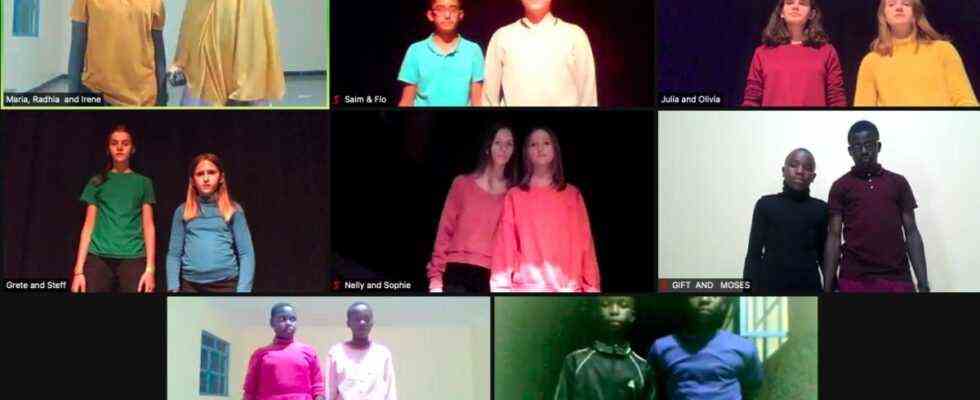“We all have desires and dreams.” Or in Swahili: “Wote tuna matarajio na ndoto.” This line of text sums up what the intercontinental theater performance of the Ernst-Mach-Gymnasium in Haar and the Ilembula Secondary School should be about: similarities instead of differences.
The schools from Haar and Ilembula have been sponsoring schools since 2017. The piece “Connected” was supposed to be performed in hair as part of a visit by the students from Tanzania. Due to the pandemic, two virtual presentations were made on Monday and Tuesday via Zoom.
“You see 16 young people. They do what they pretend. They exist. They stand, they walk, they run.” This is how the performers from both schools introduced the play. In an almost spiritual journey, the students presented their mutual relationship. They danced, performed coordinated movements, juxtaposed happy and sad gestures. A scene from Ilembula was also impressive. To see: an exam scenario. The teacher leaves the classroom, which is not uncommon in Tanzania due to the shortage of teachers. What is created is actually unspectacular: children and young people who behave in a very everyday manner. There is fooling around, teasing takes place. The scene shows a picture of everyday school life, as it would also be imaginable in Germany. According to Edwin Busl, chairman of the Schupa Tanzania association, which organizes school sponsorships such as the one between the Ernst-Mach-Gymnasium and the Ilembula Secondary School, the scene is one of many that was developed directly by the students. Parts of the piece are based on intimate questionnaires that the students filled out anonymously. The theater pedagogues Farina Simbeck and Thomas Ritter supervised the development and rehearsals of the play.
The students practiced their performance in digital space for a total of six days. Busl reports: “On the second day the students from Tanzania broke the knot. They gained confidence and really came out of themselves.” When developing the piece, care was taken to create a relaxed atmosphere with lots of music, dance and movement in order to make it as easy as possible for the young people. It was precisely this atmosphere that finally became apparent in the performance. Looseness, a lot of music and an emphasis on movement. A video clip also showed the different realities of life of the students, who lived about 6500 kilometers apart. The way to school from Germany was contrasted with those from Tanzania. Despite massive differences, similarities were revealed again, such as the use of the bicycle.
Of course, a virtual theater performance from two different continents also brings problems. Originally it was planned to place each student alone in front of a camera. In doing so, however, one came up against the limits of the Internet. Because of repeated power outages, a generator had to be purchased in Tanzania. Problems such as time delays and lags over zoom made the rehearsals difficult. Such obstacles were by no means only on the Tanzanian side, said Busl. Nevertheless, those involved rated the performance as a success. The solidarity that has been developed has been impressively displayed. “I found it very touching that groups of other students from Tanzania also watched and subsequently spoke up,” says Busl.
Claudia Funke-Mandelli from the Federal Ministry for Economic Cooperation and Development, a sponsor of the project, was among the 70 or so spectators and found words of praise for the young actors: “It was a great pleasure for me.” On an online bulletin board, viewers could leave further feedback for the students and organizers. “The distance between the hair and the Ilembula may be great. But the distance to get to know each other is small,” writes one user. Others were touched and impressed by the intercontinental theater.
Edwin Busl can well imagine a repetition of the action. Then hopefully together again on a stage when the Tanzanian delegation can be guests in Haar.

